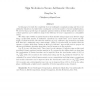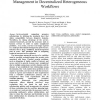80 search results - page 12 / 16 » Zero-knowledge from secure multiparty computation |
124
click to vote
PET
2009
Springer
15 years 9 months ago
2009
Springer
Abstract. Face recognition is increasingly deployed as a means to unobtrusively verify the identity of people. The widespread use of biometrics raises important privacy concerns, i...
129
click to vote
IACR
2011
14 years 2 months ago
2011
In this paper, we study the complexity of secure multiparty computation using only the secure arithmetic black-box of a finite field, counting the cost by the number of secure m...
113
click to vote
ACSAC
2001
IEEE
15 years 6 months ago
2001
IEEE
The growth of the Internet opens up tremendous opportunities for cooperative computation, where the answer depends on the private inputs of separate entities. Sometimes these comp...
119
click to vote
KDD
2004
ACM
16 years 3 months ago
2004
ACM
Secure multiparty computation allows parties to jointly compute a function of their private inputs without revealing anything but the output. Theoretical results [2] provide a gen...
102
click to vote
ICSOC
2005
Springer
15 years 8 months ago
2005
Springer
—Service-oriented computing promotes collaboration by defining the standards layer that allows compatibility between disparate domains. Workflows, by taking advantage of the serv...


